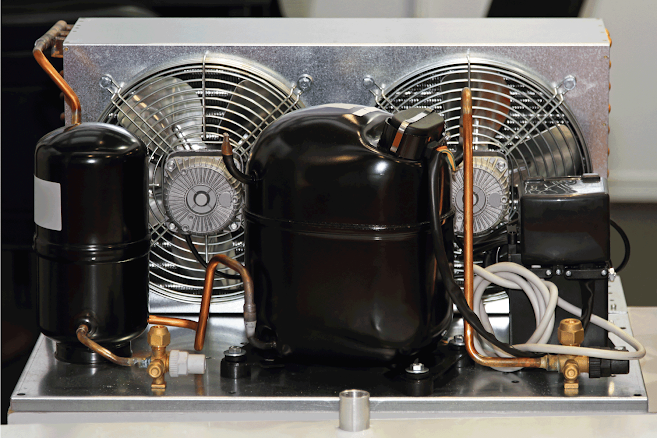The compressor in your refrigerator is a significant factor in keeping your fridge cool.
In reality, your refrigerator's compressor functions like the human heart. It's doing a great deal of work to keep the temperature you want; with it out, the fridge can be described as a vast, well-insulated cooler.
Much of the task involves compressing refrigerant (a form of hot gas converted to a cool liquid). This creates heat, which causes your compressor to become warm.
But, if the refrigerator's compressor continues to get too warm, it can create an issue.
When Is A Heated Compressor A Problem?
The refrigerant in your compressor undergoes a compression and expansion procedure, eventually removing the heat from your refrigerator to cool it. It's normal for compressors to be warm on the skin.
But, if your compressor displays one of the following signs, you can tell it is overheating:
- The noise is loud.
- The food you eat is spoiling quicker than it usually does.
- It's been a rise in the cost of your energy.
- Inside your refrigerator, it is always warm or hot rather than cold.
If you've discovered that your refrigerator's compressor has become hotter than usual, you must understand the cause.
The appliance technician in your area can inspect your compressor to identify why it may be causing excessive heat quickly.
We've listed below some of the reasons your compressor might be running hot and how our experts can resolve the issue.
You Have an Overloaded Compressor
If your compressor is always performing more than it needs to, it's"overloaded." As it is evident, an overloaded engine can suffer from failing and overheating. Overloaded compressors are most frequently caused by:
- Airflow obstruction
- The cooling system.
- Design flaws inside
To fix the issue, our experts must identify the root cause of the overload of the compressor. Below are the steps that our expert will follow to identify and correct the problem:
- Examine the condenser or evaporator coil to be sure that there isn't any blockage. Our expert will clear it or change it to increase air circulation to the appliance.
- Fix any leaks in the refrigerant to stop the compressor from being more active than it is.
- Fill your refrigerator with refrigerant.
- Repair or replace all faulty components that affect the performance of your compressor.
- Examine your appliance to confirm that it's working correctly.
If Your Compressor Does Not Ventilate Well
Compressors have to let go of their heat by compressing refrigerant. However, if the compressor does not vent properly, it can hold the heat rather than release it.
These issues concerning the part could hinder proper ventilation.
- Condenser coil jammed
- The motor for the condenser condenser is faulty.
- The compressor fan is not working correctly.
If you want to know why your compressor's not ventilating the way it ought to, our technicians can do these things:
- Cleanse the condenser coil (if necessary) to increase airflow and ventilation.
- Check that the condenser motor and the compressor fan aren't damaged or need replacement.
- Make sure that the problem does not be a problem with your compressor. If so, then we'll fix or replace the compressor.
- Make sure that your fridge is filled with refrigerant.
- Check your refrigerator and make sure the issue is solved.
If Your Compressor Has Mechanical Issues
If your compressor exhibits mechanical problems, the parts are failing and unable to relay the right messages between them so that you can cool your refrigerator.
The mechanical issues are often challenging to identify because numerous intricate components are required to ensure your fridge operates appropriately. Below are a few potential mechanical causes for why the compressor may be overheating.
- Parts of the compressor, like the motor bearings, bearings and piston, have been damaged.
- Compressors that are not functioning or damaged.
If we determine what's causing the mechanical problem, The experts at our company will perform the steps below:
- Remove your compressor from the unit and look for any damage.
- Repair any damaged or worn components in the compressor or even replace the compressor unit, if required.
- Replace the refrigerant in your refrigerator if we've opened the unit for repair.
- Examine your appliance to confirm the refrigerator's components and parts function correctly.
If Your Compressor Has Electrical Issues
Some electrical problems can be confused with mechanical problems. An obvious sign of an electrical issue is the malfunction of any of the following components:
- Thermostat
- Wiring
- Capacitor
- Protect against overload
- Start relay
The appliance technicians we have trained follow the steps below to fix electrical issues inside a compressor.
- Check the electrical components in the compressor to determine if there is an inoperable part(s).
- Repair or replace the defective component.
- Fill your refrigerator with refrigerant.
- Check that your compressor functions properly after repair or replacement.



